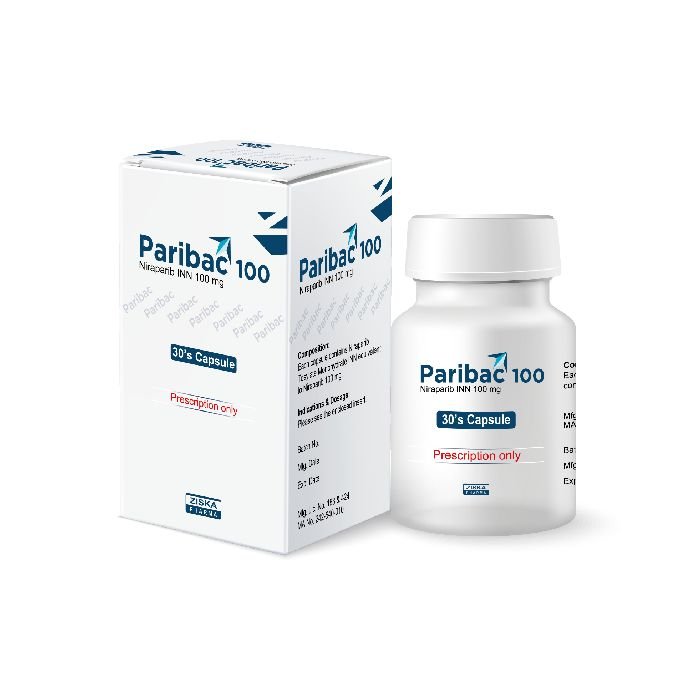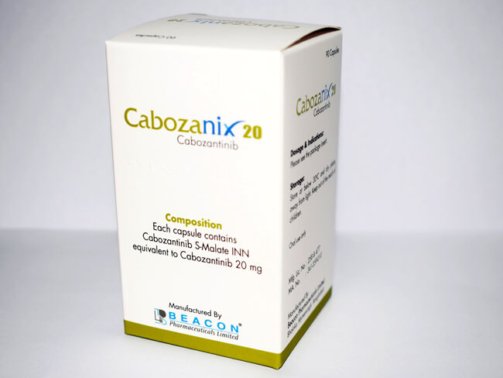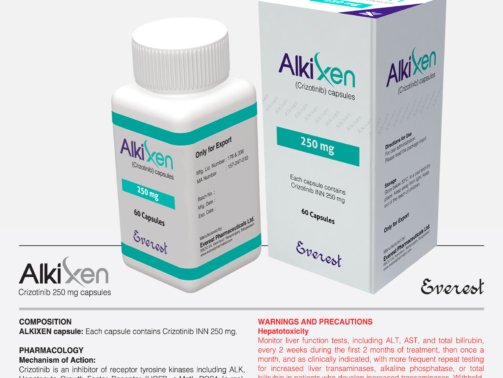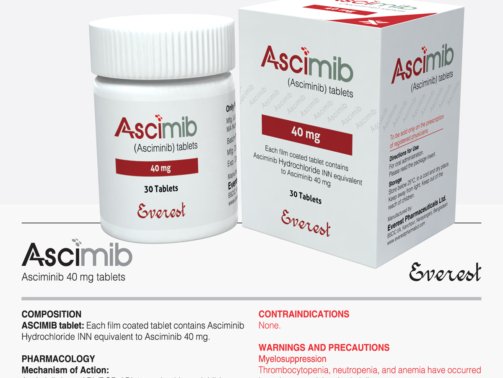Niraparib 100 mg (Zejula)
Paribac (Niraparib) 100 mg is a medication primarily used in the treatment of ovarian cancer. It belongs to a class of drugs known as poly (ADP-ribose) polymerase (PARP) inhibitors, which work by blocking an enzyme involved in repairing damaged DNA in cancer cells. Paribac 100 mg offers a targeted therapy option for patients with ovarian cancer, helping to inhibit cancer cell growth and improve treatment outcomes.
The oral prescription drug niraparib, which is marketed under the trade name Zejula, is mainly used to treat specific forms of primary peritoneal, fallopian tube, and ovarian malignancies. The class of drugs known as poly ADP-ribose polymerase inhibitors, or PARP inhibitors, includes this one. Niraparib slows the advancement of the disease by interfering with the mechanisms that cancer cells use to repair themselves. This finally results in cell death.
Zejula comes in 100 mg capsule form and is marketed by GlaxoSmithKline. Since receiving FDA approval in March 2017, it has grown to be a crucial component of maintenance treatment for patients who have responded to platinum-based chemotherapy.
Mechanism of Action
Niraparib 100 mg (Zejula) targets and inhibits PARP enzymes, especially PARP-1 and PARP-2, which are essential for cell DNA repair. PARP inhibition causes DNA damage to accumulate and ultimately results in cell death in cancer cells, particularly those with homologous recombination deficiency (HRD) or faulty BRCA1 or BRCA2 genes. This process, which is referred to as synthetic lethality, occurs when a medication takes advantage of flaws in the DNA repair pathways of cancer cells while largely preserving healthy cells.
Indications and Usage
The main indications for Zejula (Niraparib) are:
Adult patients with primary peritoneal, fallopian tube, or advanced epithelial ovarian cancer who are responding fully or partially to first-line platinum-based chemotherapy are treated with maintenance therapy.
maintenance therapy for adult patients who have primary peritoneal, fallopian tube, or recurrent epithelial ovarian cancer and who are responding fully or partially to platinum-based chemotherapy.
therapy for advanced ovarian cancer in patients with certain HRD-positive tumors who have had three or more chemotherapy treatments in the past and for whom there are no other available choices.
Because Niraparib is utilized independently of BRCA mutation status, unlike some other PARP inhibitors, its applicability to a wider range of patient populations is increased.
Dosage and Administration
The recommended starting dose of Zejula is 200 mg or 300 mg once daily, depending on the patient’s body weight and platelet count. A 100 mg capsule should be swallowed whole, whether or not you eat. Dosing adjustments may be necessary based on tolerance, side effects, and lab results.
Patients weighing less than 77 kg (170 lbs) or with platelet counts below 150,000/µL may be advised to start with a 200 mg dose daily.
The medication is typically continued until disease progression or unacceptable toxicity occurs.
Side Effects
Although not all patients will experience them, side effects are possible with Niraparib, just like with other medicine. Typical adverse effects consist of:
Vomiting and feeling queasy
Weakness or fatigue
Anemia and other abnormalities in the blood cell count, such as neutropenia or thrombocytopenia
Diarrhea or constipation
A headache
Sleeplessness
elevated blood pressure
Serious yet rare side effects include the following:
Acute myeloid leukemia (AML) or myelodysplastic syndrome (MDS), especially in patients who have had several previous chemotherapy regimens
Crises of hypertension
severe suppression of bone marrow
Throughout Niraparib treatment, routine blood pressure and full blood count monitoring is crucial.
Precautions and Warnings
Patients who have a history of bleeding disorders or high blood pressure should use Zejula with caution. Niraparib should not be taken by women who are pregnant or intend to become pregnant since it could harm the growing fetus. During treatment and for at least six months following the last dose, effective contraception is recommended.
During and for at least one month following therapy, breastfeeding is not advised.
Any indications of infection, unexplained bleeding or bruises, anemia, or exhaustion should be reported by patients to their healthcare professional.
Storage and Handling
It is recommended that Niraparib capsules be kept out of direct sunlight and at room temperature.Until it is used, keep the medication in its original container and out of children’s and pets’ reach.
Conclusion
An important development in the management and control of some ovarian tumors is niraparib 100 mg (Zejula). For many patients, especially those who have responded to platinum-based chemotherapy, it helps to improve outcomes and postpone the growth of cancer by focusing on the ability of cancer cells to repair DNA. Despite the encouraging findings, frequent monitoring and patient education regarding side effects and safety measures are essential to guarantee its safe and efficient use.
Order Now At Mdx Pharma bd….
To order from MDX Pharma BD, visit their website at https://mdxpharmabd.com, where you can browse products and place orders online. For inquiries or orders via email, contact emedicarepharma@gmail.com. Alternatively, call (+88) 01929123476. Their address is 29, Abdullahpur, Uttara, Dhaka-1230, Bangladesh.
1. What is Niraparib (Zejula) used for?
Niraparib is a PARP inhibitor used as maintenance therapy for adults with ovarian, fallopian tube, or primary peritoneal cancer. It helps prolong the time before the cancer worsens after initial or recurrent chemotherapy.
2. How does Niraparib work?
Niraparib inhibits PARP enzymes, which aid in cell DNA repair. In cancer cells, this blockage leads to cell death, particularly in cells with existing DNA repair defects (like BRCA mutations).
3. What is the usual Niraparib dosage?
Depending on body weight and platelet count, a starting dose of 200–300 mg once daily is frequently advised. Since niraparib comes in 100 mg capsules, the usual dosage is two to three capsules per day.
4. What are some typical Niraparib side effects?
Nausea, exhaustion, anemia, low platelet counts, diarrhea, and sleeplessness are typical adverse effects. Regular blood tests are required to monitor these effects.
5. Is Niraparib effective in patients without BRCA mutations?
While it is particularly effective in BRCA-mutated cancers, studies show benefits in patients without BRCA mutations as well, especially those with HRD-positive tumors.
| Generic Name: | Niraparib |
|---|---|
| Theraputic Category: | Anti-Cancer |
| Pack Size: | 30’s |

 Cart is empty
Cart is empty 



